|
Play List: 4. Corinne 7. The Mormons 9. Lucy Brandon 10. Storm-Beaten 11. Lady Clare 13. Bachelors 14. Constance 15. Lottie 16. Agnes 17. Alone in London 18. Sophia 19. Fascination 20. The Blue Bells of Scotland 21. Partners 24. Angelina! 25. The Old Home 26. A Man’s Shadow 27. Theodora 29. Clarissa 30. Miss Tomboy 32. Sweet Nancy 33. The English Rose 36. Marmion 37. The Gifted Lady 38. The Trumpet Call 39. Squire Kate 40. The White Rose 42. The Black Domino 44. The Charlatan 45. Dick Sheridan 47. Lady Gladys 48. The Strange Adventures of Miss Brown 49. The Romance of the Shopwalker 52. Two Little Maids from School ___ |
|
ROBERT WILLIAMS BUCHANAN (1841 - 1901) |
|
|
|
|
|
|
|
|
ALONE IN LONDON AFTER THE OLYMPIC - continued (ii) |
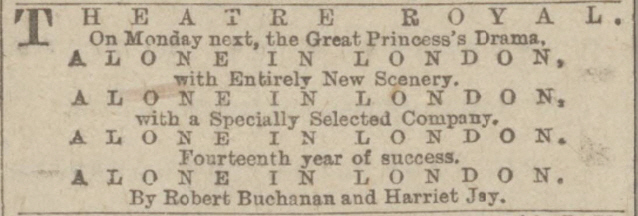 |
|||||||
|
[Advert from The Manchester Courier and Lancashire General Advertiser (25 May, 1900 - p.1).]
The Guardian (29 May, 1900 - p.8) THE THEATRES “ALONE IN LONDON” AT THE THEATRE ROYAL. Mr. Robert Buchanan had already made his mark not only in dramatic but in other fields of literary effort, so that his personal and immediate share in the authorship of this play must originally have come as a surprise to everybody. And yet the piece is not only good of its kind, but it has now for fourteen years been accounted almost a classic in this curious domain of melodrama. That it should have achieved this distinction is at once praise and dispraise. In order to have done so, it cannot have departed far from the beaten track; to have thus followed the lead of smaller men—mere mechanics, nailers-up of situations and sensations—is not a matter on which the author can plume himself. As melodramas go, “Alone in London” is effective enough. It is just about as true to life as the turbulent canvas billows which illustrate the sluice gates in the fourth act are to nature. But its main success lies not only in the directness of its purely melodramatic effects—the betrayed village maiden, her love for her child, her dog-like devotion to her villainous husband, his brutality and final attempt to murder her,—but in some interesting odds and ends of character. The lad Tom Chickweed—a character originally played by Mr. Buchanan’s collaborator, Miss Harriet Jay—is a case in point. He is a good-hearted waif, with many a human trait which goes straight at the heart of a general audience. The philosophic thief Jenkinson is unquestionably own cousin to our friend Elijah Coombe of “The Silver King,” and there is enough unction about the scoundrel to make him distinctly amusing after a fashion. A straightforward countryman and a garrulous Irish woman are among these episodical sketches, and if none of them are “creations,” they are at least entertaining figures. The purely mechanical sensation is wofully disappointing, there is not a thrill in it, elaborately as it is engineered. But some of the scenic effects are very good indeed, one of the best being a picture of the Houses of Parliament during a sitting of the House, as seen from the Surrey side of Westminster Bridge. By an ingenious arrangement of gas lamps, diminishing in size, a fine effect of perspective is obtained. The company engaged in the representation of the play is quite equal to any demands the authors make upon it. Miss Vera Beringer, as the sorely tried heroine, is duly emotional without becoming extravagant in either voice or gesture. Miss Sydney Fairbrother is a sympathetic Tom Chickweed, and Miss Ada Elliston, a débutante, and the daughter of a popular local manager, played a colourless part with considerable promise. Mr. William Clayton as the scoundrelly husband, Mr. Percy Bell as the comic villain, Mr. John Clyde as the good-hearted country miller, and Mr. Lonnen Meadows as a “humble professional,” in other words an itinerant street mountebank, gave creditable support. ___
The Staffordshire Sentinel (12 June, 1900 - p.2) WHERE TO GO THIS WEEK. HANLEY THEATRE ROYAL. “Alone in London” needs no introduction. The play has travelled long and far, but it still maintains its interest. And well it may, for it is a great drama. In it the dark side of London life has been vividly pictured by Robert Buchanan and Harriet Jay, who have shown us something of the evil of the great Metropolis in all its nakedness; and in the midst of all the misery and crime have placed a good woman. The success of the piece depends upon Nan, the faithful and long-suffering flower girl. At the Royal last night this part was taken by Miss Vera Beringer, who invested it with a living interest. The role is one that suits Miss Beringer well, and Nan—gentle, loving and enduring—as presented by her is a living reality. Supporting her in the caste are Miss Sydney Fairbrother, a waif and stray, whose true heartedness is at time extremely touching; Miss Bessie Foote (Mrs. Maloney) the true and good natured Irish woman; and Mr. John Clyde (slow and sure John Biddlecombe), whose noble nature everyone admired. As the villain Mr. William Clayton must be voted a great success, and he was well backed in his nefarious deeds by the “Benevolent Jenkins” (Mr. Percy Bell). One or two of the most dramatic situations necessitate quick changing of scenes. This is especially so at the Old Sluice House, where when the floodgates are thrown open old father Thames rushes in, and the miller comes to the rescue of the woman he loves so well. The production comes direct from the Princesses’ Theatre, London, and will well repay a visit. ___
The Era (21 July, 1900) THE WEST LONDON. One never witnesses a representation of Alone in London without thinking of the sad fate of its original heroine, Miss Amy Roselle, who impersonated Nan, the flower girl, at the production of the piece at the Olympic during the ill-fated management of Mrs Conover. The pivot of the action is the pitiless cruelty displayed throughout towards the unfortunate Nan by her husband, Richard Redcliffe—a part that was played in the first performance by Mr Herbert Standing. It now falls to the lot of Mr Charles E. Millward, whose career of dramatic villainy at Mr William Bailey’s popular theatre is punctuated with hisses and jeers from very part of the house. This tribute to his thoroughness must be taken by the actor as sufficient testimony to his success. We are afraid to say how many times Mr Percy Bell has played the part of the impostor Jenkinson, but we remember his name for years past in association with the character. Repetition does not apparently dull the edge of his appreciation of the humour of the character—occasionally sardonic. mostly obvious, but always acceptable. The part of the benevolent and good-hearted John Biddlecombe has a vein of sincere sympathy as represented by Mr John Clyde, and in the character of the waif, Tom Chickweed, the worthy West Londoners have a part entirely to their liking, and their hearts have therefore gone out to Miss Iris Ward, who invests the character with a simple pathos that never fails to tell. Miss Vera Beringer has benefited largely by her provincial experience, and though her method is broader, her acting has lost none of its daintiness or charm. The character of Nan, for its proper delineation, requires a large amount of physical energy and sustained force, and both are happily forthcoming. The part of Charlie Johnson is played with an agreeable lightness of touch by Mr Lonnen Meadows, who contributes a very entertaining character sketch. Mr Henry Beaufort’s portrait of Mr Burnaby suggests solid respectability and successful finance, and that of Walter Burnaby by Mr Roland Daniel weak-kneed resolve and faint-heartedness. Miss Ada Elliston does not lack either grace or charm as Ruth Clifton; Mr J. W. Wilkinson is decidedly effective as Spriggins; and the benevolence of Mrs Maloney, from County Cork, enables Mrs J. M. Ward to score. Liz Jenkinson is adequately represented by Miss Ada Tilley. The outcasts and mendicants are capitally made up, and care in the presentation of detail is conspicuous. The scenery, with special mechanical effects, has all the thoroughness and realism that one expects from any representation that has had the supervision of Mr J. F. Elliston, and one is lost in admiration of the fine piece of brushwork by Hemsley—Westminster Bridge and Houses of Parliament by Night. Mr Warwick Major is the courteous business-manager of the company. ___
The Era (1 September, 1900 - p.10) SHAKESPEARE, CLAPHAM-JUNCTION. On Monday, Aug. 27th, For lovers of melodrama, and their name is legion in Battersea and district, the dramatic fare for the week now ending has been the above production from the Princess’s Theatre. When seen at this house before it did fairly good business, and on the opening night of the present return visit the drama attracted a moderately good house. The artists are collectively described on the programme as Mr J. F. Elliston’s original company, under the direction of Mr Warwick Major. Chief among them is Miss Vera Beringer, who is starring in the part of Nan. She plays in good style, speaking her lines with intelligence and point. In her quieter moments she is excellent. A capital performance was Miss Ada Tilley’s impersonation of Liz Jenkinson. Her sketch of the old thief’s daughter was the embodiment of low comedy. Miss Tilley is her rags and dirt accurately caught and cleverly depicted the true spirit of the part. There could be no two opinions about Mr William Clayton’s reading of the part of the “swell mobsman” Richard Redcliffe. In his capable hands Redcliffe was an out-and-out scoundrel. In all that marks the successful impersonation of callous villainy when practised by an educated man, Mr Clayton rang the changes with admirable effect. As the bluff, generous-hearted miller, John Biddicombe, Mr George Polson played a very popular part, and played it well. Miss Iris Ward deserves honourable mention for a good piece of work as Tom Chickweed. Mr Henry Beaufort gave a good impersonation of the benevolent banker, Burnaby, and his niece and heiress, Ruth Clifton, had a handsome delineator in Miss Ada Elliston. Mr Roland Daniel essayed the part of the banker’s son, Walter, with success. Jenkinson, the thief and philosopher, was an admirable character sketch in the hands of Mr T. H. Solly, as was his more swagger pal and confederate, Spriggins, well played by Mr W. B. Nugent. Mr Lonnen Meadows as Charley Johnson, the burnt cork professor, was quite at home in the rôle. Little Paul was nicely played by Mrs A. Wood, whilst Mrs J. M. Ward was responsible for a good delineation of Mrs Maloney. ___
The South London Press (1 September, 1900 - p.2) SHAKESPEARE. “THE NIGHT BIRDS OF LONDON.” “Alone in London” has been presented this week at the popular theatre on Lavender Hill, and is evidently very much to the taste of Battersea audiences, there being a crowded house at every performance. Robert Buchanan and Harriet Jay’s interesting drama has been seen here on a previous occasion, but it is powerful enough for a series of visits. The company is a strong one, and has the great advantage of the presence of Miss Vera Beringer, whose Nan, the flower girl, is a pleasing and sympathetic creation. The great sensational scene in the river dock goes as well as ever.—There will be another London drama next week, “The Night Birds of London,” which was so successful when produced at the Duchess a week or two back, being announced for Monday evening. It is a stirring drama with plenty of sensational interest. ___
The Scotsman (23 October, 1900 - p. 5) “Alone in London” was presented at the Grand last evening by a very strong company under the direction of Mr Robert Buchanan and Miss Harriet Jay. The part of Nan the flower girl was ably sustained by Miss Vera Beringer, and she was well supported in the drama. A large audience appeared to extract a considerable amount of pleasure from the rendering of the familiar story. ___
The Bath Chronicle (29 August, 1901 - p.2) THEATRE ROYAL. “Alone in London,” which is being played by Mr. J. F. Elliston’s company at the Theatre Royal this week, should find full favour in the popular portions of the house. Of its kind, the play is good. In it we are shown every class of life, from a common lodging house to highest life, with most of the intermediate stages. The most striking feature of the production is the scenery, which is really very fine, views like Westminster Bridge and Trafalgar-square being exceedingly true to life. The acting of the various parts, which number 23 in all, was of a fair standard, although, the parts being very conventional, of necessity so was the acting. Miss Sidney Crowe played the heroine “Nan,” the flower girl, and received full praise for her rendering, while Mr. F. Joynsen-Powell was hissed enough even to warm a villain’s heart. John Biddlecombe was played well by Mr. W. H. Brougham, whom we fancy we have seen before in “The Little Minister.” The other parts, too, are satisfactorily filled. What is most surprising is that a man like the late Robert Buchanan should write such a play. The only explanation is that it was written so many years ago that the average theatre-goer cannot understand the public temperament in those days. ___
The Stage (24 July, 1902 - p.11) THE CAMDEN. Alone in London has a strong hold on popular favour which seems to increase rather than diminish with the lapse of time, and its former triumphs are being equalled, if not excelled, at the Camden this week. A good melodrama is a most satisfying of dramatic entertainment, and no one can gainsay that the late Robert Buchanan and Harriett Jay have given us in this work a fine example of the species. Camden Town likes a play of this genre, and is never slow to mark its approbation, showing ready sympathy with the much-tried heroine and meting out groans and hisses to the crime-stained villain. The piece is acted with all-round excellence by Mr. J. F. Elliston’s company. Miss Gertrude Evans makes a distinct impression as the heroine, imparting much reality to the pathetic scenes with which the part abounds. In a totally different manner Miss Ada Tilley, an actress of the Louie Freear type, gets on good terms with the audience; she is very droll throughout, but is at her best in act one—the lodging house in Drury Lane. Miss Frances Ferina, too, wins much applause for her meritorious work as the crippled boy Tom, and Miss Bessie Foote is no less effective as Mrs. Maloney. Mr. Henry Crocker is cleverly made up as the rich and kindly banker, Mr. Burnaby, and plays in a quiet, gentlemanly manner well suited to the part. Richard Redcliffe, the villain, is enacted with force by Mr. Stephen Ewart, who makes himself thoroughly repulsive to the gallery. Spriggins is amusingly portrayed by Mr. J. W. Wilkinson, and Mr. T. H. Solly makes Jenkinson an entertaining scoundrel. Mr. Lonnen Meadows is highly successful as the humble professional, Charley Johnson, in addition to having all the cares of stage manager to the company. Mr. Arthur C. Percy plays with robust earnestness as John Biddlecombe, and is popular from his first entrance. Mr. Creagh Hunt shows ability in the few opportunities at his disposal as Walter Burnaby, and Miss Lillie Lewis is adequate to the requirements of the character of Ruth Clinton. Next week the Camden will be closed for the usual summer vacation, reopening on August Bank Holiday with The Silver King. ___
The Scotsman (19 August, 1902 - p.6) THEATRE ROYAL. “Alone in London,” by the late Robert Buchanan and Harriet Jay, is the play at the Theatre Royal this week, and as usual when this drama comes to Edinburgh, the cheaper parts of the theatre were crowded last night. The company responsible for the production—Mr J. F. Elliston’s—is a capable one, and the drama suffers nothing in its representation. The villainy of the swell mobsman and his accomplices, the sufferings of the heroine and her child, the benevolence of the rich banker, and the humour of the “professional” and his wife, were all brought out effectively, and the audience hissed, cheered, and laughed heartily in turn. The swell mobsman was capably represented by Mr Stephen Ewart, and Mr J. W. Wilkinson and Mr T. H. Solly were successful in the characters of his accomplices. As Nan, the heroine, Miss Gertrude Evans won the sympathy of the audience. The other members were capable performers. ___
The Dundee Courier (14 October, 1902 - p.5) HER MAJESTY’S THEATRE. “ALONE IN LONDON.” A huge holiday audience met in Her Majesty’s Theatre last night, and one which applauded virtue and hooted vice in no measured terms. ___
The Manchester Courier (24 August, 1909 - p.10) QUEEN’S. “ALONE IN LONDON.” “Alone in London” is one of these good old melodramas which seem to wear well. Perhaps the chief reason of this is that it gives a picture—realistic perhaps—of the elemental emotions peculiar to mankind, leavened with that sense of humour without which life even in its most tragic phases would be impossible. This drama has appeared already on many a provincial stage, but nowhere should we think has it been so well presented as it was last night at the Queen’s, Manchester. Indeed, Mr. Charles Gibbon has to be congratulated on its excellent presentation by a company who individually and with a proper sense of proportion understood their respective parts. ... Miss Nellie Clyde, as “Nan, the Flower Girl,” filled her part effectively, whether grave or gay; and Mr. Russell Norrie, Mr. Gerald Jordan, Mr. J. W. Wilkinson, and Mr. Henry Eglington imbued the drama with that atmosphere intended at least by one of its authors, Mr. Robert Buchanan. Again we have seen decidedly worse scenery and worse stage setting in “more pretentious” dramas. |
|||||||
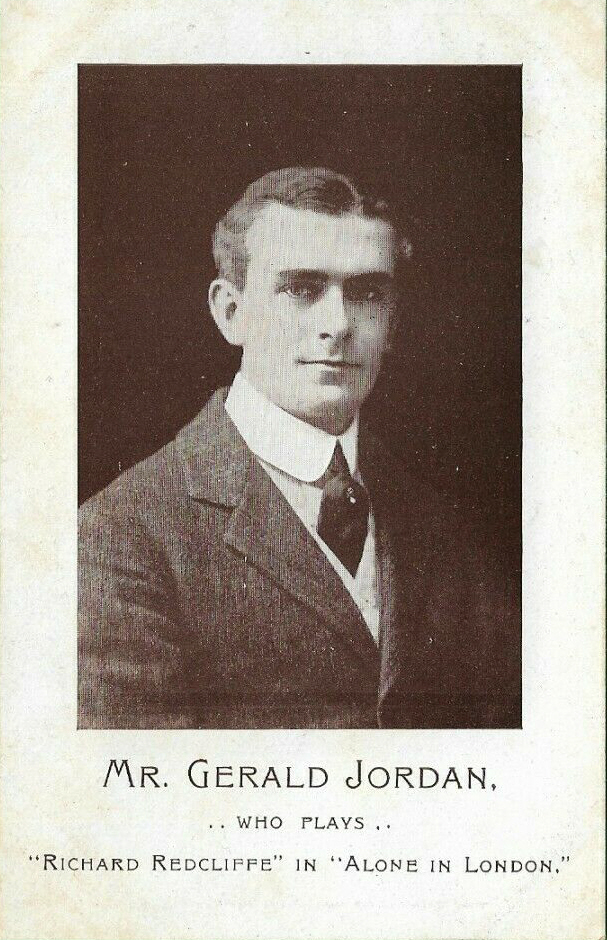 |
|||||||
|
The Guardian (25 August, 1909 - p.7) “ALONE IN LONDON” AT THE QUEEN’S.—At the Queen’s Theatre this week a company directed by Mr. Charles Gibbon gives “Alone in London” once more. The company includes several members who have experience in good work, and the play has the touch of talent that was in everything written by Robert Buchanan—in this case a collaborator with Miss Harriett Jay. ___
The Daily Mirror (21 June, 1910 - p.7) The veterans of the English stage are passing away with a disquieting rapidity. Last week Hermann Vezin, on Sunday morning his old companion and fast personal friend, Henry Neville. It is good to remember that Vezin and Neville, together with that fine actor and sterling good fellow, “Lal” Brough, made their last appearance side by side in Sir Herbert Tree’s revival of “The School for Scandal,” not quite twelve months ago, at His Majesty’s Theatre. It is a far cry back to May 27, 1863, when, at the old Olympic, by his creation of the part of Bob Brierley, Neville pulled the veteran Planché out of his stall at the first fall of the curtain with the triumphant and historical cry: “Thank heaven, at last, at last we have an actor!” Born in 1837, he was then only twenty-six years of age, and yet could boast of twenty-three years of actual theatrical experience. He had made his first appearance at the tender age of three, carried on in the arms of his father as the infant in Sheridan’s “Pizarro.” His father had destined him for the Army, but he headed for the stage with the certain instinct of genius sure of itself, like a duck to water. Years of bitter hard work in the provinces, in every conceivable kind of part, had given him the surety of touch, the perfection of method, for which, as a metropolitan actor, he was from the first remarkable. He was nearing his sixtieth year when he was cast for the part of the hero in Robert Buchanan’s “Alone in London,” a jolly, boyish Yorkshireman in the early twenties. “Are you quite sure you can ‘get there,’ Neville?” asked the author, with easily excusable nervousness. “My dear boy,” replied Neville, “I am an actor. If I undertook to play the part of a baby in a cradle I’d pull it off.” The little story is as good a portrait of the man as could be furnished by a ten-volume biography. Almost to the last he carried his years with astonishing lightness, both on and off the stage. The English stage to-day is the poorer by a fine artist, the world in general by a true man, a loyal friend, and a right good fellow. His private life was touched, years ago, by a bitter tragedy, and he had besides his full share of the more ordinary rubs of life, but few men have borne either the great or petty ills of mortality with a more cheerful face or with a serener courage. |
|||||||
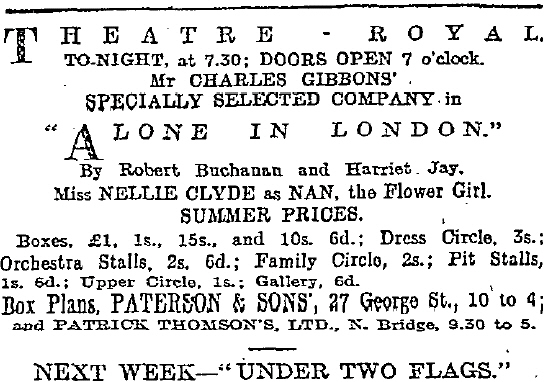 |
|||||||
|
[Advert from The Scotsman (12 August, 1910).]
The Aberdeen Daily Journal (16 August, 1910 - p.4) AMUSEMENTS. HIS MAJESTY’S THEATRE. “ALONE IN LONDON.” “Alone in London” has held its place continuously on the stage for about twenty years, and still its popularity knows no decline. When produced in Aberdeen the play never fails to win cordial appreciation, because of the skilful blending of pathos and humour, the wealth of stirring incident, and the vivid contrasts presented by the large number of strongly-marked characters. The author, Robert Buchanan, was not always happy in his literary ventures, but his writing for the stage was remarkable for its virility and sincerity, and these are perhaps the qualities that have mainly contributed to give “Alone in London,” its wonderful vitality. Last night a large audience had the pleasure of seeing the drama to the fullest advantage, all the parts being filled by thoroughly competent players. Miss Nellie Clyde, as Annie Meadows, afterwards known in London as “Nan, the Flower Girl,” gained the sympathy of the audience at once by her grace and simplicity in the earlier scenes, and her pathetic pourtrayal of the sorrows and sufferings of Nan, after her life has been blighted by the vile artifices of a heartless scoundrel, was deeply impressive. The miller, John Biddlecombe, a bluff, hearty, honest fellow, who comes to the rescue of Nan when she has been brought to the verge of despair, found a capital representative in Mr W. S. Stevenson, whose breezy and dashing style was exactly suited to the part. Mr Charles Gibbon “played the villain” in a vigorous and incisive fashion, that earned for him the stern reprobation of the gallery—a compliment that the capable actor no doubt fully appreciated. It will be remembered that the gang of scoundrels, under the leadership of Dick Redcliffe, boasts of a philosopher in the person of “Old Jenkinson,” whose reflections impart a quaint piquancy to his knavery. This character was assigned to Mr J. W. Wilkinson, whose “make-up” was a marvel of skill, and whose assumption of imperturbable self-complacency was diverting in the extreme. Mr Bruce Lindley played brightly as the light-hearted actor, Charlie Johnson, and Miss Ethel F. Greene displayed the requisite simplicity and tenderness as Tom Chickweed. A hearty word of praise is due to the other members of the company, who are to be congratulated on the unequivocal success of a representation the effect of which was enhanced by elaborate scenic and mechanical accessories. |
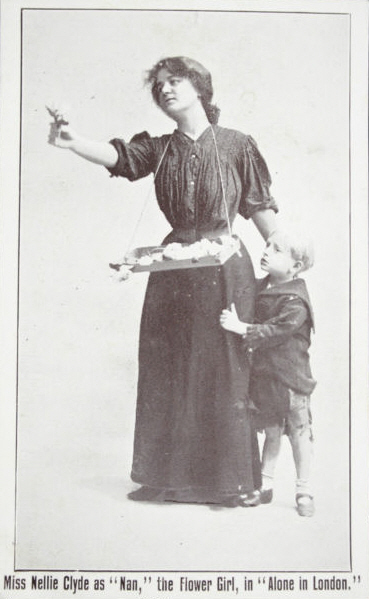 |
|||||
|
The Evening Telegraph (Angus, Scotland) (23 August, 1910 - p.5) HER MAJESTY’S THEATRE. “Alone in London.” Laughter and tears come pretty close together in this famous melodrama. Probably much of the humour which convulsed the house last night was not to be found in the original form of Robert Buchanan and Harriet Jay’s famous play; but, be that as it may, the fun, some new, some very hoary, quite pleased the popular portion of the audience. There could be no mistake about the sympathetic responses which came from the gallery during the more poignant and touching passages, and the hissing and spontaneous ejaculations which greeted the villain’s cruel treatment of his wife and child bore testimony to the fact that many present found the drama very much to their taste. ___
The Dundee Courier (23 August, 1910 - p.6) HER MAJESTY’S THEATRE. “ALONE IN LONDON.” It is eight years since Robert Buchanan’s and Harriet Jay’s famous play was last presented in Dundee. Prior to that we used to have biennial productions of it, and in all the play has now seen something like 25 years of life. |
|||||
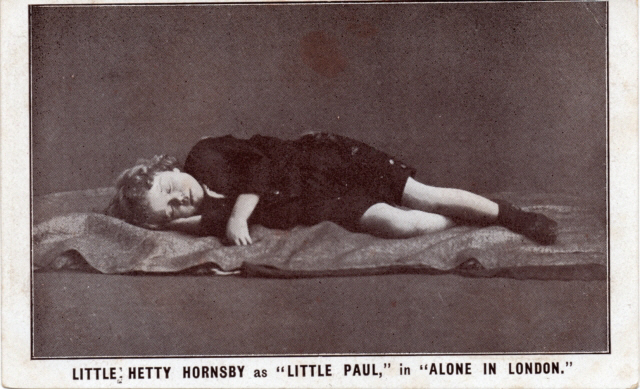 |
|||||
|
I have to thank Meredith Lawrence for this postcard of Little Hetty Hornsby c. 1910 (printed by Stafford & Co. Ltd., Netherfield, Nottinghamshire). I also came across this mention of her in the Newcastle Daily Journal (2 August, 1910) in a review of another play, The Little Stranger: “As the midget Tom Pennyman, little Miss Hetty Hornsby quite took the house by storm last night. Her impersonation of the baby who smoked cigarettes, drank his father’s whisky, and otherwise persuaded the credulous Mrs Dick that the soul of her vanished husband had reappeared in the body of Dick, jun., was, to say the least of it, exceedingly smart and droll withal.” |
|||||
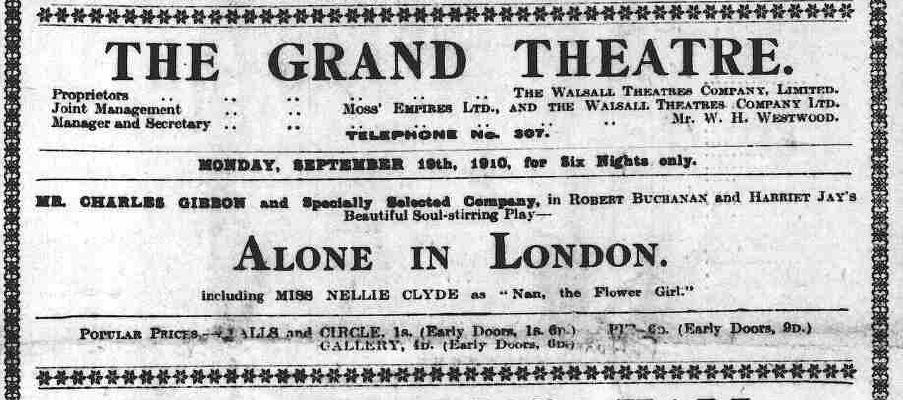 |
|
[Advert for Alone in London from The Walsall Advertiser (17 September, 1910 - p.1).]
The Era (8 October, 1913 - p.15) AMUSEMENTS IN JOHANNESBURG. . . . STANDARD THEATRE.—L., Mr. Leonard Rayne.—The Howitt-Phillips company are concluding their season by the revival of the evergreen melodramas “Alone in London” and “Two Little Vagabonds.” _____
In August 1915 a film version of Alone in London was released, directed by Larry Trimble and starring Florence Turner. The details are as follows: ALONE IN LONDON (1915) Cast: Hal Erickson in the All Movie Guide gives the following information: “American film star Florence Turner is Alone in London in this 4-reel British mystery. Turner goes against the grain of her established screen image by playing a meaty character role as a woman inexorably involved in crime. Henry Edwards co-stars as one of the “good guys,” while Edward Lingard represents the “bad” contingent. Ms. Turner, the onetime “Vitagraph Girl,” was herself the producer of Alone in London; it was the last in a successful series of British productions financed by Ms. Turner in conjunction with England’s pioneer filmmaker Cecil M. Hepworth. The director was Larry Trimble, Turner’s lifelong friend. Alone in London was based on a play by Harriet Jay and Robert Buchanan, which presumably ran longer than the film’s allotted 48 minutes.” |
|||||
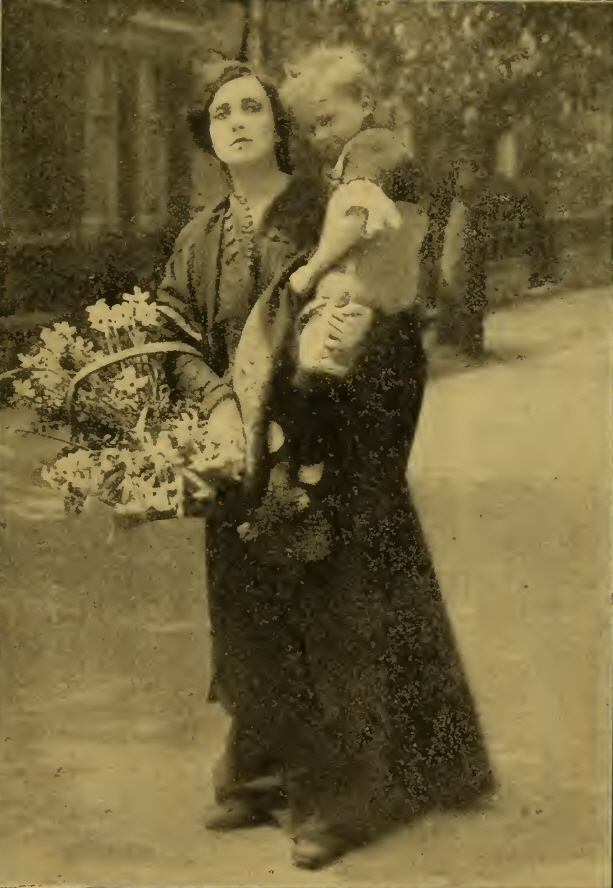 |
|||||
|
The All Movie Guide also has this brief biography of Florence Turner: “At age three Florence Turner began appearing in stage productions, and was already a veteran actress when she joined Vitagraph at age 21; the year was 1906 and the dawn of popular cinema was at hand. Credited only as the Vitagraph Girl, she became one of the screen’s first stars. In 1913, she went to England with Larry Trimble, her frequent director and long-time friend; they performed together in London music halls and formed Turner Films, their own production company. Turner sometimes co-wrote and/or directed her own films. From 1916-20 she lived in the U.S.; from 1920-24 in England; and after 1924 in Hollywood. However, her popularity had greatly decreased as the popularity of films boomed; she went on to play secondary roles and eventually had to beg for work. In the ’30s she was put on the MGM payroll, but it was an act of charity: she was used only as an extra and in bit parts.” And there is more information about Florence Turner at the Women Film Pioneers Project. |
|||||
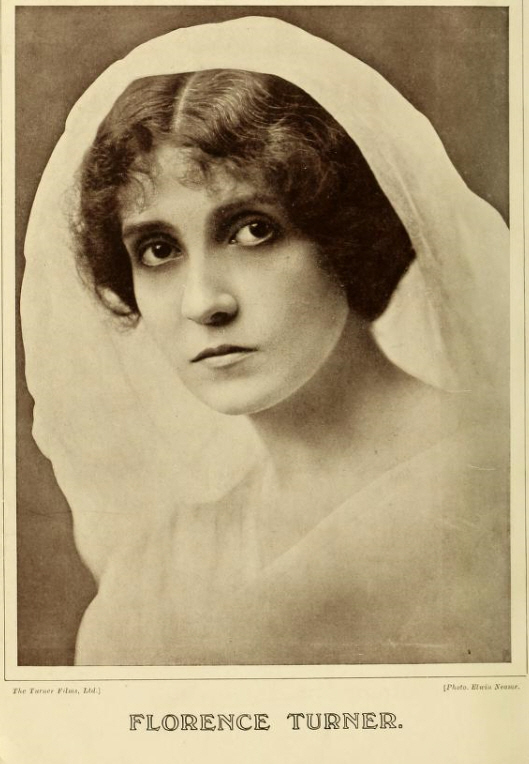 |
|||||
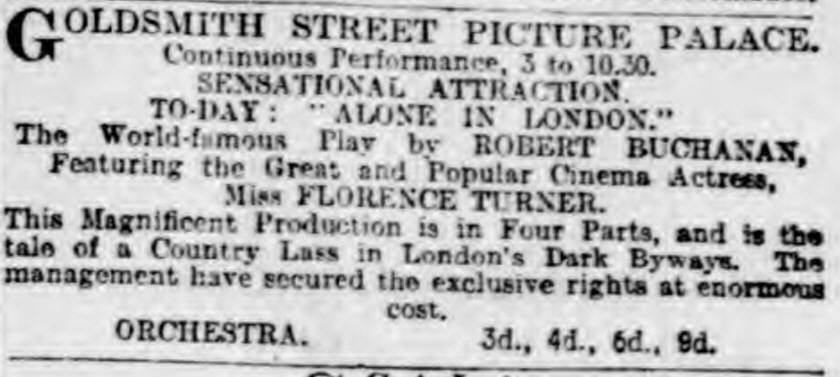 |
|
[Advert from The Nottingham Evening Post (20 September, 1915 - p.3).]
The Grey River Argus (New Zealand) (29 March,1916 - p.6) POLLARD’S PICTURES. “ALONE IN LONDON.” What memories of Bland Holt and his splendid melodrama performances are revived by the name “Alone in London.” This very successful melodrama ranks with the great “The White Heather,” “New Babylon,” and other productions too numerous to mention that were all the rage during this wonderful actor-manager’s career. “Alone in London” is the true type of play so dear to the heart of a Londoner; full of quick, snappy dialogue; magnetic with sensational incident after incident, that culminate in the true dramatic situation. This story of a woman fighting against great odds to evade the pitfalls that beset the life of a girl in the poorest, richest, brightest and darkest city in the world, gains additional strength in the cinema production, inasmuch that scenes which were timber, calico and paint were relied upon for the background, whereas in the photoplay we have the true city scenes—the huge luminous crowds of this mighty city, throbbing and pulsating for a setting. “Nan,” the country maiden, is impersonated by the most charming of all cinema actresses, Miss Florence Turner. The moving picture panorama of scene and life in the great Metropolis forms attraction enough without the aid of the powerful play of which it is only an incident. “Alone in London” forms the whole of the second part of to-night’s display, and starts at 9.10 p.m. The first portion of the programme consists of a Gaumont scenic study of a village in Upper Egypt, situated on the Nile, entitled “A Trip to Leexor”; a Flying A. domestic drama, “The Problem”; the Vitagraph comedy, “The Right Girl,” the latest number of the animated Gaumont Graphic, and music by the full orchestra. ___
The Morpeth Herald (19 May, 1916 - p.8) A SUMMER-TIME BILL In these times of stress a good laugh is certainly beneficial, and to secure this “Charles the Great” at the Playhouse tonight (Friday) and Saturday, in “Charlie at the Bank” will justify the investment if you want to laugh in the face of everything. “Simon, the Jester” is also shown, when Edwin Arden, a familiar figure on the screen at the Playhouse is seen to advantage. A picture appealing to almost everyone, adapted from the Robert Buchanan’s famous play, “Alone in London,” will be screened on Sunday night first—a stirring portrayal of the exploits of a country lass in London’s dark byeways. The story, beginning in a tumble-down hovel in a London slum depicts a ragged lad who becomes the unwilling instrument of swell cracksmen. The scene, finding scope, winds its way into the heart of a beautiful countryside, where the dreams of the heroine, after a period of unparalleled hardship ends up with her shaking the dust of a modern Babylon from her feet and finding happiness at last amid the country meadows she loves so well. In five parts, this picture, featuring Florence Turner, should not be missed.
[More reviews in the Robert Buchanan Filmography section, and Florence Turner’s 1914 comic short, Daisy Doodad’s Dial, is available on youtube.] _____
And, finally, I came across this in The Stage (31 August, 1922 - p.22): |
|||||||
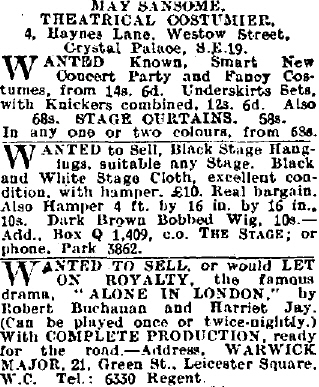 |
|||||||
|
Which I thought was the end of the line for Alone in London, until I found this advert in The Stage (4 October, 1923 - p.21): |
|||||||
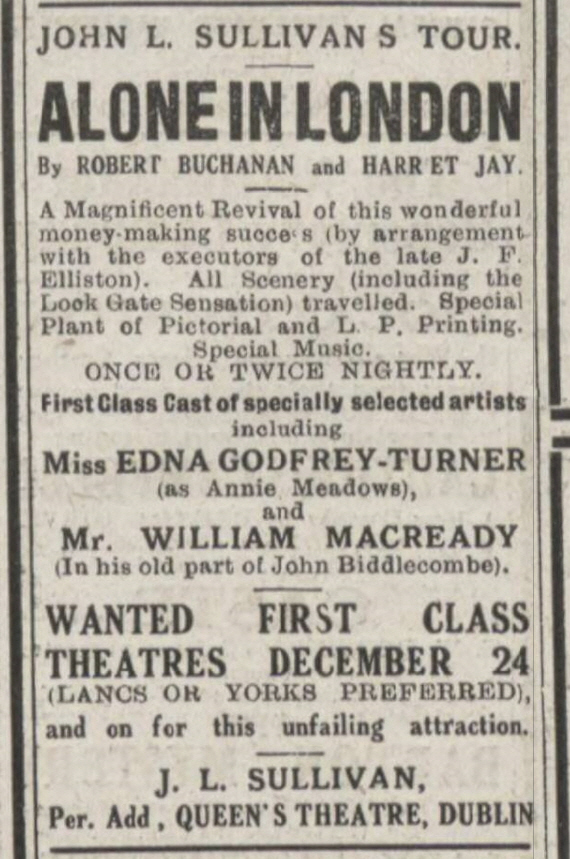 |
|||||||
|
The Londonderry Sentinel (23 October, 1923 - p.5) DERRY OPERA HOUSE. Last night Mr. William Macready’s talented company opened a six nights’ engagement in the Opera House with the ever popular drama, “Alone in London,” which has gained fame and secured success in two Continents. The these of the drama is one which has a strong appeal to an audience, and the presentation last night was so realistic that the audience marked their appreciation by frequent outbursts of applause. The outstanding characters in the cast embraced William Macready, who personated “John Biddlecombe” (a miller); Edna Godfrey-Turner, “Annie Meadows” (the keeper’s daughter); William Melvyn, “Dick Redcliffe” (an adventurer); George Wallace, “Jenkinson” (Redcliffe’s accomplice); Pearl O’Donnell, “Gypsy Tom” (a waif). There being half a dozen others, who added their quota to the success of the drama. The scenes were laid for the most part in London, and indicated the deception of an adventurer and the love of a true-hearted woman, who had made him her choice in preference to the hand of a wealthy miller (“John Biddlecombe”). As “Dick Redcliffe<” a heartless deceiver, Mr. William Melvyn filled the role to perfection, but naturally the sympathy of the audience and their heartiest applause was showered on Edna Godfrey-Turner in her splendid personation of a faithful, loving wife through all her adversity. Mr. George Wallace as “Jenkinson,” the chum and accomplice of “Redcliffe,” filled the role admirably, as did also Pearl O’Donnell as a “Gypsy Waif.” It was, of course, in the closing scenes that Mr. William Macready had his triumph and he was heartily applauded in his manly representation of the man whose first love never wavered for the girl who had been deceived by an unworthy partner. _____
Back to Alone in London main menu or on to Sophia
|
|
|
|
|
|
|